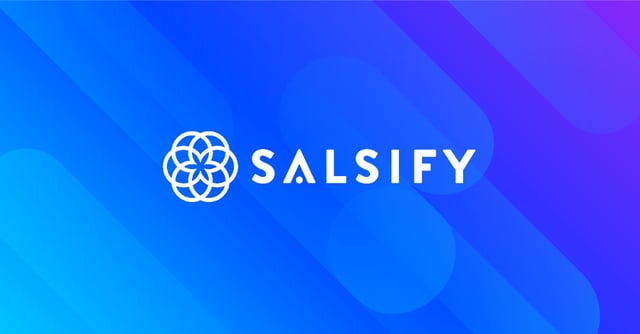

Salsify PXM
Learn how the unified Salsify PXM solution helps brands take control of their performance on the digital shelf.
LEARN MOREPIM
Manage all product content in one central system of record.
Syndication
Easily syndicate product content to every consumer touch point.
Enhanced Content
Enrich product pages with below-the-fold content and rich media.
Intelligence Suite
Bring AI-powered capabilities directly into your Salsify workflows.
Grocery Accelerator
Leverage the first-ever category-wide PXM accelerator in the grocery industry.
GDSN Data Pool
Synchronize standard supply chain, marketing, and ecommerce attributes globally.
Digital Shelf Analytics
Continuously optimize your organization’s product content syndication.
Catalog Sites
Share secure, on-brand, and always up-to-date digital product catalogs.
Automation and AI
Automate business processes and enhance Salsify workflows with AI.
PXM Platform, Integrations, and APIs
Integrate the PXM platform with the rest of your enterprise systems architecture.
Supplier Onboarding
Accelerate supplier onboarding while ensuring your schema requirements are met.
Product Listing
Sell products faster with Product Listing.
Content Enrichment
Increase online conversions with Content Enrichment.
Automation
Save time and increase operational efficiency with retail automation.
SXM Platform, Integrations, and APIs
Integrate the SXM platform with the rest of your enterprise systems architecture.
Syndication Network
Automate how you exchange product content data to the digital shelf.
Enhanced Content Network
Turn product pages into product experiences with Enhanced Content.
Commerce Platform Integrations
Create winning product experiences everywhere shoppers are, including on owned sites.
GDSN Data Pool
Synchronize standard supply chain, marketing, and ecommerce attributes globally.
Open Catalog
Connect to the digital shelf faster with an open, standardized, and free product catalog.
Resources
Resource Library
Explore our ecommerce resources to get everything you need to win on the digital shelf.
Blog
Read our blog to get actionable insights for navigating changing markets and industry demands.
Webinars
Watch our on-demand ecommerce webinars to gain expert advice and tips from our community of industry leaders.
Customer Blog
Gain the latest tips, industry trends, and actionable ecommerce insights.
Knowledge Base
Investigate our knowledge base to build your Salsify skills and understanding.
API
Examine our comprehensive API and webhook guides to start working with Salsify quickly.

Our latest report shares shoppers' fresh insights on buying behavior, loyalty, AI trust, and more.

"I lean on Salsify all the time — from their customer success team and my onboarding team to my account managers. They have been with me every step of the way, ensuring we met all of our goals for 2020 and can look ahead to the '"next normal.'"
— Sheri Stoller
Director of Ecommerce, Trilliant Food & Nutrition
Long before the COVID-19 pandemic shook up the ways we work, play, and shop online, the digital shelf revolutionized the way marketers reached customers in both on and offline spaces.
Now more than ever, customers discover, research, and buy products by engaging with touchpoints scattered throughout the digital shelf: behavior that is, for better or worse, non-linear, random, and happening all the time.
Companies who traditionally underemphasized — or even ignored — their approach to those spaces may have found themselves scrambling to go digital in the first quarter of 2020.
But I understood how essential digital transformation would be for my ecommerce team as we tackled the early days of the COVID-19 pandemic.
My name is Sheri Stoller. I serve as the director of ecommerce for Trilliant Food & Nutrition and lead the design, development, and implementation of our ecommerce and digital shelf strategy.
Victor Allen's Coffee, now Trilliant Food & Nutrition, began in 1979 and became a well-known regional Wisconsin favorite: A manufacturer of precision-roasted, specialty coffees with batches that are famously taste-tested five separate times before hitting the store shelves.
While many shoppers moved to the digital shelf at the start of 2020, several best practices helped our team navigate this shift and continue to innovate and pivot as we move into this "next normal" of commerce.
As the impact of COVID-19 grew apparent in early 2020, it was clear that we didn't have time to wait: Overnight, consumer habits drastically changed.
Our customers were no longer driving to Starbucks every day, drinking coffee at the office, or even socializing with their friends. Obviously, we'd need to reconsider our entire approach.
I was only a month into my role at Trilliant before the pandemic began and knew we'd have to hit the ground running. Having implemented Salsify at two other companies before joining Trilliant — both small (40-plus SKUs) and large (1000-plus SKUs) — I led the charge to integrate the Salsify Product Experience Management (PXM) platform at our organization.
Forming our "power team," we worked quickly to pursue our goal of implementing Salsify in just 30 days. It was essential to set an ambitious but achievable goal as we quickly identified our new normal.
Take care to be realistic, and establish key performance indicators (KPIs) that are focused on the most impactful priorities for your company.
Digital transformation doesn't work with a set-it-and-forget-it approach. It's a long-term investment and strategy for your organization. Taking consistent baby steps — and working out all the kinks along the way — is a much better approach than trying to do everything at once.
For our team, the goal was straightforward enough: Get our products performing well on Amazon as quickly as possible, with a focus primarily on the highest-performing SKUs. Your goals will likely be different, depending on how deep your company is along its ecommerce journey.
There is a logic to taking achievable, small steps before moving on to more ambitious ones.
Think about onboarding Salsify at your company the same way you'd think about building a house: You start from the ground up, with the foundation. Spend the time you need to understand what you need your data to do and design your road map accordingly.
This approach also means exercising a low tolerance for errors or other problems that can quickly snowball as you scale up Salsify's integration into your organization. While data problems are inevitable from time to time, you must get these first steps right to avoid even more significant delays in the future.
All too often, it's very easy to think, "We'll come back to that later!" — oftentimes, however, "later" doesn't happen. Remember: This is data that will cascade to all of your retailers and consumers across your digital shelf — it's not the time for embracing shortcuts or holding back on accountability.
A recurring challenge I've faced while implementing Salsify throughout my career? The skeptics.
You may find some of your colleagues question the value of integrating the platform at all, while others are concerned about the timing (especially in such a volatile market). Others may believe your existing data framework is so complicated as to be beyond redemption or improvements.
That's why it's essential to take the time to educate others about the benefits of Salsify: Share your ecommerce strategy with all the stakeholders in your organization, and make sure everyone understands the long-term gains earned from this short-term crunch.
Take the time to conduct both group, team, and one-on-one training, when necessary. You can also rely on Salsify's customer success team, which was a tremendous help in providing resources to address these concerns.
Celebrating your wins is one of the most important ways to keep the fuel burning during a large project of this nature. It was a tough first thirty days for our team, but when we finally published to Amazon, it was a fantastic feeling.
We celebrated again when we published to five additional retailers beyond Amazon — which, thanks to our careful baby steps during the initial onboarding process, was a breeze.
Salsify simply keeps getting better and better. I lean on Salsify all the time — from their customer success team and my onboarding team to my account managers. They have been with me every step of the way, ensuring we met all of our goals for 2020 and can look ahead to the "next normal."

Learn how the unified Salsify PXM solution helps brands take control of their performance on the digital shelf.
LEARN MOREStanding out on the digital shelf starts with access to the latest industry content. Subscribe to Below the Fold, our monthly content newsletter, and join other commerce leaders.